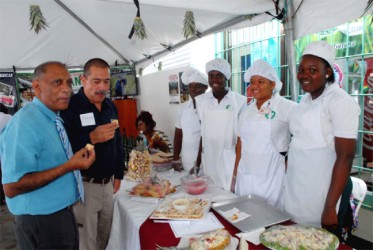Last Friday was not the first time that the corner of Alexander and Robb streets hosted a modest display of local products. On Friday, it was the pineapple’s turn to shine and the event attracted displays of modest numbers of drinks, pastries and condiments all made from pineapple.
It is a modest if useful initiative on the part of the Guyana Marketing Corporation’s Guyana Shop. Events like this provide opportunities for the marketing of small and micro enterprises being run by ‘little people’ most of whom get no more than modest returns for their efforts. Perhaps the Guyana Shop might be a springboard to entry into the bigger supermarkets though there is always the concern that the prevailing standards in local manufacturing are not, for the most part, up to the requirements of the well-appointed downtown supermarkets offering predominantly imported foods.
Events like last Friday’s pineapple affair are not to be frowned upon. They reflect the determination of women, particularly though not exclusively, to try to remain financially independent through their pursuits in the cottage industries. However, as Agriculture Minister Dr Leslie Ramsammy pointed out not so long ago, none of these determined people are likely to live happily ever after on the returns they receive from their economic pursuits.

If you have been following these events carefully enough and over a sufficiently lengthy period of time it is bound to occur to you that occasions like last Friday’s pineapple event, have not really grown much, save and except that there has been a considerable measure of improvement in the labelling and packaging and of course there is the GMC’s Guyana Shop to help market the products.
To put it bluntly, we simply have not been able to expand these tiny displays much beyond what they used to be 30 years ago. Let’s face it, a dozen sets of exhibits displayed on as many tables on the pavement outside the GMC might afford us occasion to pass some time but it really says nothing about the extent to which those cottage industries which were around at least as far back as the 1970s have grown.
The truth is – and Minister Ramsammy can carry on until he is blue in the face about standards – that we have only been able to make ‘baby steps’ in those areas that really matter. These include securing access to the technology associated with enhancing product quality, and increasing volumes. More than that and again despite the minister’s views on the quality and taste of some of the locally produced commodities compared with some imports, the problem of international acceptance goes beyond labelling and packaging. Guyana, for example, still has quite a few formidable hills to climb before it can get to the summit of the USA’s Food Safety Modernization Act, a piece of legislation that sets standards stringent enough to be deemed formidable non-tariff barriers and which is likely to prevent much of the manufactured goods coming out of Guyana from seeing the light of day on supermarket shelves in the United States.
So while Minister Ramsammy is perfectly right to insist on quality as regards products seeking space on shelves inside the GMC’s Guyana Shop, items of food that target the US market will have to pass considerably stiffer tests associated with the FSMA regulations.
There is a good deal of evidence that small operators are prepared to put in the effort that is necessary. But the truth is that the costs associated with setting up the factories that have to do with production are prohibitive.
Up until the advent of the Small Business Bureau just a few weeks ago, access to funding for investment in small businesses was a huge imponderable.
Truth be told, last Friday’s pineapple affair was pretty much more of the same. Over the last three decades, we should have gone much further in the areas of volume, variety, manufacturing techniques and readiness for export.
The small businesses of all those years ago – at least some of them – ought to have been thriving enterprises today. On the whole we have not done enough.




